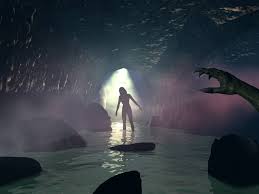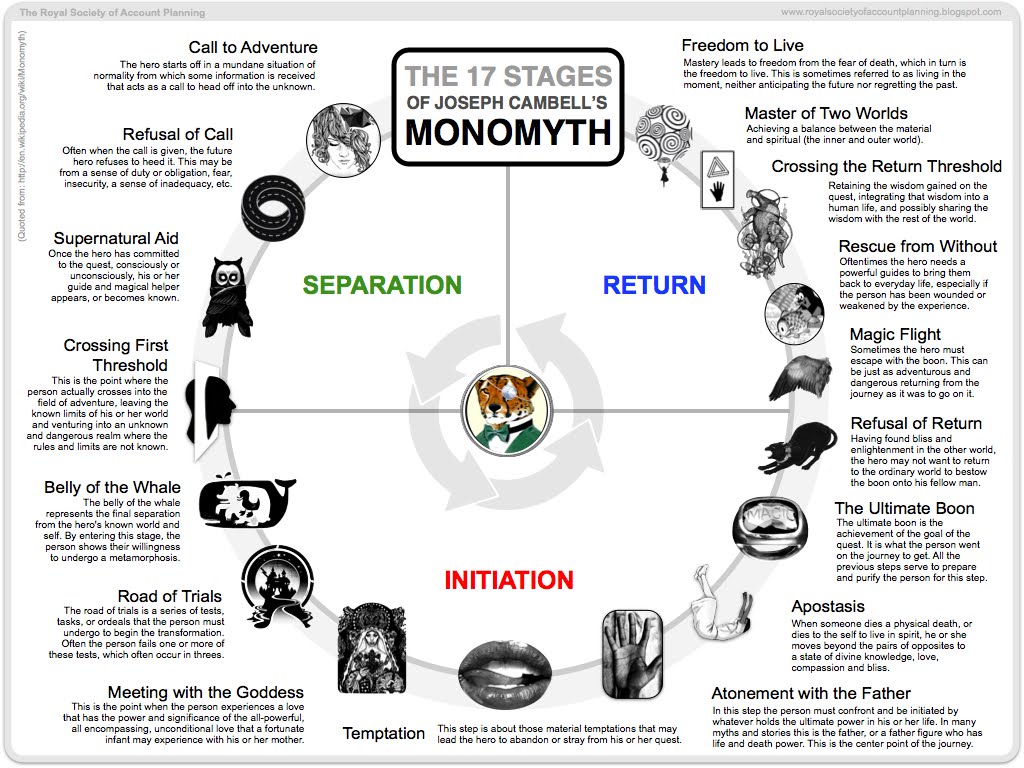 Joseph Campbell spent a lifetime studying myths and stories from around the world, especially the ones that related to life’s biggest questions: Where did everything come from?; Is there purpose to the things that come up in our lives?; How do we as human beings fully flourish? For him, we as human beings aren’t seeking meaning so much as experience–the “experience of being alive, so that our life experiences on the purely physical plane will have resonances within our own innermost being and reality, so that we actually feel the rapture of being alive”–and he believes that life is structured to allow this unfolding of deep experience to take place. Through his immersion in great art and literature and the stories that seem to come up in every culture and every human life, he came to conclude that there is one story of all stories, a monomyth, that expresses this call to adventure, and which is woven into the structures of the universe (even as deep or deeper than DNA) such that it can and will play out in our lives. The trick will be to recognize it. This monomyth, he believes, is the “Hero’s Journey”: “A hero ventures forth from the world of common day into a region of supernatural wonder: fabulous forces are there encountered and a decisive victory is won: the hero comes back from this mysterious adventure with the power to bestow boons on his fellow man.”
Joseph Campbell spent a lifetime studying myths and stories from around the world, especially the ones that related to life’s biggest questions: Where did everything come from?; Is there purpose to the things that come up in our lives?; How do we as human beings fully flourish? For him, we as human beings aren’t seeking meaning so much as experience–the “experience of being alive, so that our life experiences on the purely physical plane will have resonances within our own innermost being and reality, so that we actually feel the rapture of being alive”–and he believes that life is structured to allow this unfolding of deep experience to take place. Through his immersion in great art and literature and the stories that seem to come up in every culture and every human life, he came to conclude that there is one story of all stories, a monomyth, that expresses this call to adventure, and which is woven into the structures of the universe (even as deep or deeper than DNA) such that it can and will play out in our lives. The trick will be to recognize it. This monomyth, he believes, is the “Hero’s Journey”: “A hero ventures forth from the world of common day into a region of supernatural wonder: fabulous forces are there encountered and a decisive victory is won: the hero comes back from this mysterious adventure with the power to bestow boons on his fellow man.”
In this episode, Carol Lynn Pearson and David A. Stacey join Mormon Matters host Dan Wotherspoon in unpacking Campbell’s model, but also applying it to LDS lives, including their own. They explore Mormon scriptures and stories, including the biggest one of all, the Plan of Salvation, in terms of the Hero’s Journey. Through it all, they encourage everyone to examine their own lives in terms of this structure. Where are we on our hero’s journey? Who is serving for us some of the roles that the pattern describes? What forces are keeping us from journeying to the inmost cave and meeting our deepest fears and having the fight there that will kill us and allow us to be reborn as masters who can then share with others the boons we have gained? In the end, the panelists conclude that it does not matter if one ends up deciding whether the universe or powerful beings within it truly structure reality in such a way that these adventures, visions, and empowerments are available to us all or if this is a structure we have learned to apply to our lives to help us feel oriented especially in extremely difficult times. For them, the Hero’s Journey “works”–and that is as “real” as anything needs to be.
We hope you will listen and share your reactions and experiences in the comments below!
_________
Links:
Joseph Campbell and Bill Moyers, The Power of Myth, Part 1: “The Hero with a Thousand Faces”
“The Hero’s Journey–Your Call to Adventure,” YouTube video slide show featuring a 12-step outline of the Hero’s Journey (8:17)
Carol Lynn Pearson, The Hero’s Journey of the Gay and Lesbian Mormon



Comments 7
the tape that plays is about institutions, not the hero’s journey.
Thanks! Fixed the file last night. Sorry I didn’t see these notes then. Hope you’ll enjoy the episode!
yes, thanks, Dan. I’ve been listening to it sporatically thru the day as I’ve had time. It’s very interesting.
I got the same as Karin
I found it interesting that JS might have ‘tuned into’ the mythical archetypes as his inspiration, making some of his stories inspiring and full of truth. But I like to find truth in whatever I read. So that’s not new for me. The difference is that most authors know their stories are not ‘true’ and don’t pitch them as being real actual events. This helps me to ‘take the best of the BOM, or the ideas found therein’ and leave the rest behind’, as the 12 step groups say. (Ammon cutting off arms with some hatchet kind of sword is sooo gross, and unbelievable except that I had believed the story for years because i’d been taught to take all scripture literally.)
I’d never heard about the ‘belly of the whale’ part of the journey and like how that gives meaning to the bible story. I’d just read that story to my daughter not too long ago, so she knows the myths of the western world, without actually buying into their reality.
I wish you’d have talked more about the ‘average’ person’s journey/ s. Carol’s story is fascinating and a great example, as is Harry Potter’s, but little ole me wants to relate this to my life too. I want to be ‘harry potter’ and i’d love to know that I am/ have been at one point or another and maybe that’s why the story resonates with me so much.
Thanks Dan. As usual, another good interview. I find the idea that much of what we find in scripture and in Mormon history to by mythic or not based in actual experience interesting. I am not a literal reader of scripture in all cases but I have come to believe that much if not all is rooted in some kind of real physical experience. The more important question for me is not whether or not the event happened–I will tend towards more of belief that it did–but how much of the prophet’s world view and natural human tendencies are coloring their revelation or the experience they are relating.
A simple example is Noah and the flood: For Noah, it was the entire earth as he new it. I doubt it was the entire earth as he knew it. Was their a large scale flood? Very likely. Not sure about the rainbow story but I like it.
Other examples become more complex–like Abraham being told to sacrifice his son. Or Nephi whacking of Laban’s head. I still think they are real events but I’m less certain about God’s direct role in them.
Lately I’ve been exploring the idea that is promoted in the scriptures of God being wrathful. At this point I can’t square that idea that he is–as defined by current definitions–since it seems to be contrary to how the same scriptures define the character of God as charity, or the pure love of Christ. A vengeful and wrathful God is not one that I have come to believe in nor want to give my allegiance to.
I did find it interesting how you assumed that David had the same world view that you appear to have–that most of what we have is myth not based in historical fact. I’m expressing it this way to give you the opportunity to clarify if you’d like the impression I have of your position–at least position at this time in your evolution of thought.
For me, to place the divinity of Christ as a mythic idea, rather than an actual historical fact–however imperfectly that event has been revealed to us rips the heart out of the gospel of Jesus Christ. If Joseph Smith only created myths based in manufactured historical events, then that also rips the heart out of the idea of the restored gospel of Jesus Christ.
The idea that a God would come down and live among us, to learn how to nurture us and gain the power to inspire, heal, and raise us from mortality is as powerful a concept as it gets. That’s a god I can buy into. I would reject a god whose intelligence and power is so beyond mine but requires my heart, mind, and strength, while having no concept of the difficulty in requiring such perfection from a mere mortal.
I understand the value of myths and great stories and enjoy them not only for entertainment but enlightenment. I can see the hand of God in them and believe the timeless and great ones are inspired by a great collective truth rooted in a reality that we can only tap into in an incomplete way.
At the same time, I can believe that there are actual events rooted in real history (too often embellished I’m sure) that express those same truths but in a non-fiction way.
I have had too many intellectual and remarkable spiritual witnesses for me to conclude that Jesus Christ is just a nice idea and a profound teacher and not the son of God come down. In the end, it is only a personal spiritual witness that can give an individual a belief in the Christ’s identity. While it can’t be proved, evidence can be presented that he was a God. For me the Book of Mormon is an important tool not only for the physicality of his resurrection but also to engender a witness from the Spirit that he was what the scriptures proclaim him to be.
Keep up the good work. Thanks Dan
This was one of the more enjoyable podcasts. I’ve listened to it three times.